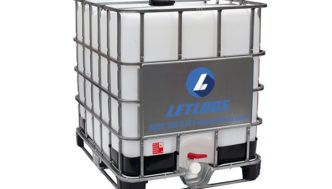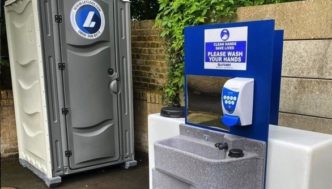
The UK has quite a pedigree when it comes to hosting music festivals. The south-east of England alone is home to a number of exciting names on the festival calendar, including Latitude, V Festival and Secret Garden Party. That’s even before we’ve touched on the plethora of celebrations that take place in London, including Lovebox, Wireless and All Points East. Clearly, Britain has much to brag about when it comes to live music events.
While millions of Britons flock to these music meccas every single year, few of them give pause for thought about the time, effort and money that goes into their organisation. Of course, those in charge of putting on festivals will be all too aware of the myriad of minute details that need to be ticked off and checked up on to ensure everything goes off without a hitch. From staging and acoustics to catering and sanitation, there are so many plates for organisers to keep spinning. Although it might not be the most glamorous item on their to-do list, arranging festival toilet hire is certainly one of the most important.
After all, any mass gathering of people is going to need somewhere for them to answer the call of nature – especially in situations where alcohol is an ever-present! For that reason, it’s imperative that you provide adequate toilet facilities for your guests. However, tackling the issue in the modern world is a very different proposition from how things used to be, so let’s take a moment to peer into the past history of musical festival toilet hire before we turn our gaze towards the future.
Table of Contents
Back in the day
While the idea of music festivals stretches back centuries (or even millennia when taking into account harvest festivals, solstice festivals and the suchlike), the modern-day events which we recognise in Britain has its roots in the 19th and 20th centuries. Indeed, to find something even faintly resembling a music festival of today, you only have to delve back as far the 1960s.
Heavily inspired by the 1967 Monterey Music Festival in California in the United States, the first music festivals sprang up in the UK in the ensuing years. The inaugural edition of the Isle of Wight Festival took place in 1968, with only a handful of people in attendance, but word got around about its existence so rapidly that within just a couple of years, over 600,000 music lovers flocked to the island for the event.
One of those festival-goers in 1970 was Andrew Kerr, one of the co-founders of the now world-famous Glastonbury Festival. Kerr and his fellow festival pioneers conspired to create a less commercial event that was truly for the people, hosting Glastonbury Fair in 1971 to a modest crowd of 12,000 people. Entrance was, astonishingly, free to anyone who cared to attend.
Of course, with virtually no funding and a very hippie vibe, the toilet facilities at such an event were severely lacking, to say the least. Suffice it to say that the Somerset surroundings received their fair share of fertilisation that weekend! Fortunately, 50 years on from that landmark event, the music festival has come a long way – and so too have the sanitation facilities which cater to their attendees.
Modern music festivals
While the free-to-attend extravaganza laid on by Kerr and co was something of a novelty at the time, music festivals these days are a common occurrence in the UK calendar. And with that familiarity there has come a certain expectation among the paying public, not only in terms of the calibre of bands and artists they wish to see, but the level of service and sanitation they demand.
For many years, that demand was met with the humble but effectual portable chemical toilet. These self-contained units are still widely popular today and afford users a discreet way to relieve themselves, while storing the resultant waste in secure leak-proof tank. The chemicals used to treat the waste break it down into a more easily processable substance and also work to neutralise odours, improving the festival toilet experience.
But while these sturdy stalwarts are still a great option for music festival toilet hire, the rising numbers and the diversity of the attendees means that more options have been developed to meet those new demands. For example, there was a time not long ago when such festivals were the stomping ground of the young, fit and able-bodied to the almost outright exclusion of all others.
However, progress in social equality means that those with reduced mobility or physical or mental disabilities can now enjoy the festival experience in all its glory. A huge factor in achieving that inclusivity has been the advent of easy access toilet hire, which offers greater room and bespoke features for wheelchair users or those with specialised needs to move around in and make use of the facilities. They’re also generally equipped with a baby changing station, which has become more and more practical in an age where festivals are now family-friendly events.
Meanwhile, the swelling numbers of music festivals mean that there’s more demand for a free cubicle than ever before, especially at peak times of the day. This has led to lengthy queues at the portable toilets and caused frustration among festival-goers, who find themselves missing out on their favourite acts because they’re not able to answer the call of nature as quickly or as efficiently as they might like.
Step forward the four-man urinal. These open-air structures are ingenious in their ability to let the male attendees at a festival relieve themselves speedily and discreetly, thus cutting down the queues for the standard toilets significantly. Both cost-effective and space-efficient, four-man urinals are an excellent tool in the festival organiser’s armoury for keeping queue lengths to a minimum.
Multiple toilet trailers are another great way to combat queue lengths and provide festival-goers with a greater degree of privacy and comfort, especially if the organiser plumps for a luxury unit. These sophisticated pieces of festival infrastructure come in two-, three- and four-WC units, with basins for all, mirrors and lighting to let users freshen up and ample space inside for a really premium feel. There are a whole host of advantages to upgrading to these luxury alternatives, especially in VIP sections of the festival layout.
One other aspect of musical festivals which has changed considerably over the last half century is the duration of the whole event. In the early days of the music festival, it was commonplace for the occasion to take place on a single day or perhaps over a weekend, but now, four-day, five-day and even week-long events are not uncommon. Sleeping in a tent and foregoing the mod cons of a hotel room still comprises part of the attraction of a festival for some people, but a week without paying attention to personal hygiene is perhaps a little too much.
That’s why these days, more and more festivals are equipping their sites with mobile shower units. Fitted with water heaters to ensure that each individual shower can have its temperature regulated independently, these deluxe units come with anti-slip flooring and a variety of washroom amenities. Simply put, they’re a must-have for the modern festival which can stretch out for days at a time.
As you can see, the current state of play when it comes to festival toilet hire is a far cry from the primitive options offered at the dawn of live UK music events. With such an affordable and versatile selection of facilities to choose from, it’s now easier than ever for organisers to arrange sufficient sanitation services to accommodate their customers and ensure a happy festival experience for all. But what exactly does the future hold for music festival toilet hire?
What next for music festival facilities?
Given how different today’s music festivals are from those which paved the way for the industry 50 years ago, it’s difficult to predict with any degree of certainty what future music festival toilet hire will look like. That’s especially true when taking into account the relentless march of technology, with new innovations and inventions surfacing almost every single day.
One thing that’s certain is that today’s society is increasingly mindful of its environmental obligations. Climate change, global warming and other ecological concerns are more and more prevalent in our newspapers, TV stations and political speeches, so it’s logical to expect that a greater emphasis on sustainability and eco-friendliness will dominate the UK festival scene in the coming years.
Of course, there are certain environmentally conscious portable toilet options already in use at some major festivals, including Glastonbury. Compost loos are a particularly popular option and involve users sprinkling sawdust into the toilet basin after use in order to minimise the unpleasant smells that follow a session on the pot. Other waterless systems, such as those which use a dry powder waste gel instead of H2O, are also becoming more commonplace in portable settings.
Indeed, water isn’t the only precious resource which portable toilets consume. Flushing units or those with lighting and heating also demand copious amounts of electricity. While the amount they use individually is nearly negligible, the cumulative drain on the power grid across the entire industry and calendar of events is quite sizable. That’s why there are solar-powered alternatives in development, which can flush, light and heat a unit without taxing the planet.
From using less resources to using more of them, there’s also the possibility that the festival toilet hire of tomorrow will go completely the other way and follow the Japanese model. For those unaware, toilet design in the land of the rising sun is far more elaborate than in many other parts of the globe, with units offering the user the chance to warm their seat, spray water on their underparts and even take advantage of deodorisation capabilities. Is it something we’ll see infiltrate the UK music festival scene any time soon? Perhaps.
Another possibility for the future of portable toilets at music festivals and other events is the arrival of self-cleaning cubicles. These new-fangled contraptions already exist in some forward-thinking cities around the globe and involve the sealing and disinfecting of the entire unit while it is unoccupied, thus enhancing hygiene and reducing nasty aromas.
Given that many festival sites end up smelling less than fresh by their final day, self-cleaning cubicles could be a welcome addition to the scene. For now, of course, there is still the option to hire human toilet attendants, who can certainly perform a more effective clean-up job than any robot is capable of – at least currently. Who knows what the future will bring?
Organise your next festival toilet hire today
At LetLoos, we understand just how stressful it can be to get all your ducks in a line when organising an event as multi-faceted and sprawling as a music festival. That’s why we’re keen to take one worry off your mind and arrange your festival sanitation facilities with the minimum of fuss, leaving you free to tackle more important and more engaging considerations.
Whether it’s portable toilets, luxury toilet trailers, easy access toilets, four-man urinals or mobile shower units you wish to hire, we have a full selection of equipment to cater to the needs of any situation. We can also provide our clients with tank emptying services for festivals which take place over a number of days and toilet attendant and cleaning services to guarantee they stay as fresh and clean as the day they were delivered. Speaking of which, we’ll happily drop the units off at your site and install them in position, then pick them up again once the event has come to a close.
Don’t let the hygiene and sanitation of your festival prey on your mind any longer. Get in touch with our friendly team today, who will be happy to answer your queries and furnish you with a no-obligation quote, free of charge. Just drop us a message and we’ll get back to you as soon as we can. Take the first step towards a cleaner, happier and better equipped festival site today!



